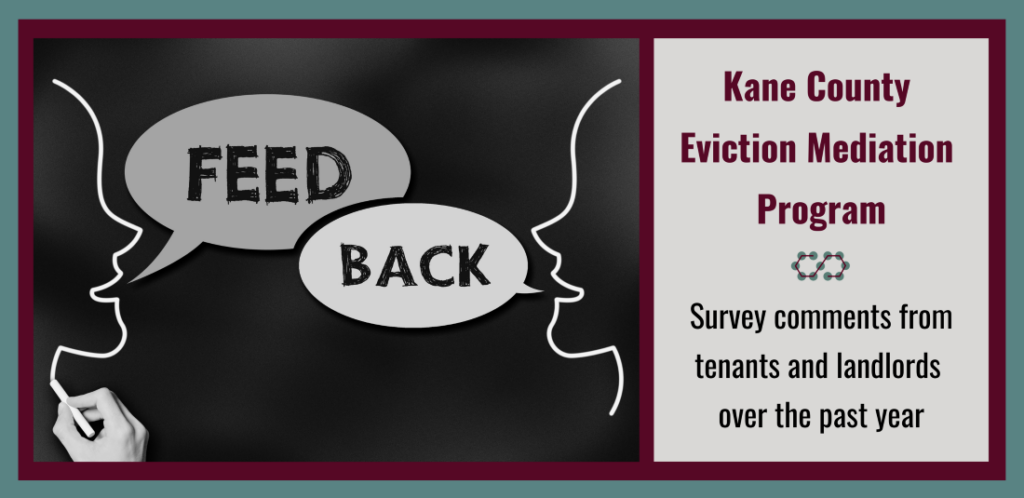Since 2020, Resolution Systems Institute has administered the Kane County (Illinois) Eviction Mediation Program. Our team works with the 16th Judicial Circuit Court and community services to mitigate the negative effects of eviction filings. We conduct intake, schedule mediations, provide guidance for parties going through eviction mediation, manage the mediator roster, and provide assistance to the mediators as needed. After parties participate in mediation, we ask them to complete a survey about their experience, including answering multiple open-response questions.
Landlord and tenant comments on the program and their mediations illuminate what they value and what falls short for them. We have seen how the process makes parties feel respected and listened to, and what that means for them. We have also learned of issues that arise with power imbalances and with mediators who repeatedly facilitate cases involving the same attorney.
Mediation as a ‘Life Preserver’
Comments from the past year make clear that many parties have been profoundly affected by their experience with our program and their mediation. This is perhaps best exemplified by this comment from a tenant: “Everyone has their own reasons for difficulties. I got a chance to say how this happened and also how I can prevent it from happening in the future. I’m thankful for everyone who has helped me through this and being treated fairly and with respect. This program is a life preserver to a drowning person. Thank you.”
Another tenant shared a similar sentiment, saying, “When people go through a difficult time, this program gives them a chance.”
Mediator Role is Key
As with so many mediation programs, mediators are central to parties’ positive experience in the Kane County program, survey responses show. In fact, the presence of a knowledgeable, impartial mediator is one of the most appreciated aspects of the program. One participant noted that the mediator “listened to both sides of the story.” Another commented: “I really appreciated . . . the way the mediator helped to point out the facts of the situation and allow both parties to express themselves. As a tenant without a lawyer who’s been through a major financial crisis, it gave me the opportunity to be listened to and to get my head above water.”
Many survey respondents praised their mediators’ ability to help parties find compromise. As one tenant put it, “They really try to meet in the middle and make everyone happy in the end. It gives so much clarity and security.” Another tenant succinctly stated, “It gave a compromise to a no win situation.”
Participants noted that both the skills of the mediators and the structured nature of the mediation process ensure that all parties have a chance to contribute to the conversation. A tenant shared: “Both sides were given the opportunity to speak uninterrupted. Everything was explained clearly and the mediator was very pleasant to work with. I came in feeling anxious not knowing what to expect but was pleasantly surprised by the whole experience and outcome.” A landlord shared that it was “good to talk to the other party in the presence of some responsible people.”
“The meeting was not at all stressful once the call was started. Each party received ample time to discuss any offer, explanations of situation, possible resolutions to ensure both parties benefited.”
Tenants in particular mentioned the importance of feeling listened to. When asked what they liked about the mediation, tenants described mediators who “listened to my doubts and questions,” were “helpful and caring and want to hear what you have to say,” or gave all parties “the opportunity to discuss their thoughts and concerns.” A landlord added that their mediator “listened and asked good questions.”
Additionally, mediators were often commended for their patience and thoroughness, as exemplified by this comment: “The [mediator] was very respectful and kind and listened to all my doubts and questions. The [mediator] helped a lot and explained everything in very good detail.” Another participant described their experience this way: “The meeting was not at all stressful once the call was started. Each party received ample time to discuss any offer, explanations of situation, possible resolutions to ensure both parties benefited.”
These comments underscore the program’s success in creating an environment where both tenants and landlords feel they can speak openly, are listened to and are treated equitably.
Resources for Vulnerable Individuals
Several survey responses highlighted the program’s value for vulnerable individuals. For example, a number of comments mentioned the importance of the resources beyond mediation that the program can connect parties with. One tenant wrote that the program “was there to help me [with court paperwork] when they really didn’t have to.” Multiple commenters emphasized that they had applied to the court-based rental assistance program — which the mediation program directed many parties to, and which parties were able to access until funds ran out in June 2024. When asked if they would recommend eviction mediation to a friend, a tenant shared that they would (even though they didn’t settle their case in mediation) because “sometimes tenants are unaware of the resources available due to lack of communication or shame.”
Others expressed more general appreciation for being able to participate in the program as someone in a challenging situation: “Just every single mother that actually works and tries 100% for her and children deserves this opportunity.” Another shared: “I think it is an excellent program for families who are going through difficulties, personally I felt supported and confident in the ability of this incredible program to help.”
Perceptions of Mediator as Biased
Some survey respondents indicated that their mediators worked to minimize the usual power imbalance between tenants and landlords. For example, one commented: “My mediator was a rockstar ! The attorney tried to bully us and was interrupting them but they kept their calm and brought up my rights.”
However, some tenants expressed concerns about potential bias in the mediation process, with one tenant stating, “They are there to mostly help the landlord … It doesn’t help the tenant. At all … The mediator is on the landlord side to help them evicted you.”
“I felt because the lawyer and the mediator were familiar with one another they may have been more partial to the landlord.”
Similarly, a tenant shared, “Not only was I not informed what mediation was going to be like, but also the mediator didn’t take everything I said and just went with what the landlord [said].” And one tenant went so far as to say, “I feel like I was gaslit by the Lawyer, and [the lawyer], as well as the mediator didn’t want to hear my side.”
Some comments about pro-landlord bias reflected a tenant’s understanding that the mediator already knew or had worked with the landlord’s attorney in the past, with one tenant writing: “I felt because the lawyer and the mediator were familiar with one another they may have been more partial to the landlord.”
Another explained: “[I]t’s like the mediator and the landlord and the landlord Lawyer have some kind of friendship already[,] so that kind of singles you out when they’re cracking jokes and laughing with each other[. A]nd then [the mediator is] only hearing [the landlord’s] side and telling you [that] you have to take your side to court.”
Other criticisms related to feeling unduly pressured to reach an agreement. One tenant explained how they felt both unheard and pressured: “I feel as if, regardless what was disclosed, my landlord and his attorney pushed too hard at a hard no to mediation, not giving me a chance, and the mediator seemed to take what I had to say about the situation with a grain of salt.” Another tenant stated, “My concerns were not fully addressed, felt bullied into settling.” One expressed their frustration, saying: “The mediator didn’t listen to my needs and disregarded any of my opinions[. The mediator] listened to every word the lawyer said and also wrote anything they wanted word for word.”
How RSI Uses Feedback
RSI uses party responses to our post-mediation surveys both to evaluate and improve our program, as well as to tell the full story of the eviction mediation process. These firsthand accounts allow us to go beyond statistics to better understand how eviction mediation programs affect real people in our communities. Furthermore, these comments provide invaluable evidence of the program’s tangible benefits. By thoughtfully analyzing and presenting these comments, we strengthen our partnerships, justify program funding and, ultimately, improve our ability to effectively serve the Kane County community.
RSI takes party criticisms of our mediators and program very seriously. Every quarter, we evaluate the participant post-mediation survey responses to determine what is or is not working. Every month, we hold meetings with our program staff to review our findings. We also use our research to train mediators on how to cultivate better party experiences. When necessary, we provide further training and support to mediators with recurring issues. Occasionally, if feedback was provided but no improvement made, we remove underperforming mediators from our roster.
Negative party perceptions, even if not reflective of actual bias, indicate a need to ensure and communicate impartiality more effectively. While it can be demoralizing to read party comments complaining that a mediator was biased, these comments help us to understand the impact that such perceptions have on party experience. Mediation is meant to be a level playing field for all parties — landlords and tenants, unrepresented parties and those with attorneys.




